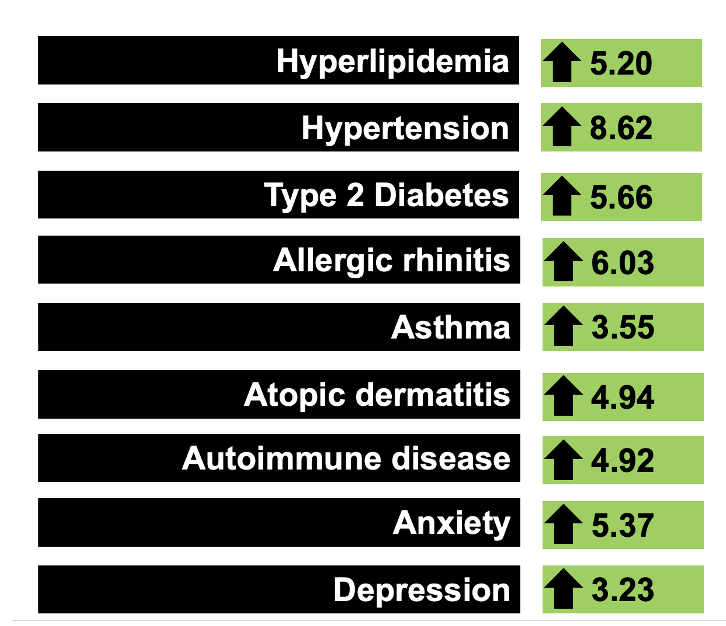Autoimmune, Atopic, Metabolic, and Psychiatric Comorbidities in CCCA
Comorbidities in CCCA
A new study showed that patients with CCCA have a higher prevalence of autoimmune, atopic, metabolic, and psychiatric comorbidities. Prior studies have examined some of the cormorbidites that might exist with CCCA. Some of these studies suggested that CCCA is associated with several comorbidities including diabetes, metabolic dysfunction, bacterial scalp infections and uterine leiomyomas.
Joshi et al 2023
Authors of a new study set out to investigate comorbidities that are associated with CCCA. The database used was the National Institute of Health’s All of Us research program database.
There were 201 patients with CCCA. Each patient with CCCA was matched to one age-, race-, ethnicity-, and gender-matched control. CCCA patients, compared to controls, were more likely to have metabolic abnormalities: hyperlipidemia (OR: 5.20, 95% CI: 3.37–8.03), hypertension (OR: 8.62, 95% CI: 5.46–13.59), and type 2 diabetes (OR: 5.66, 95% CI: 3.46–9.25).
CCCA patients were also found to have increased odds of having an autoimmune condition (OR: 4.92, 95% CI: 2.58–9.34).
CCCA patients were more likely to have atopic disease including allergic rhinitis (OR: 6.03, 95% CI: 3.54–10.26), asthma (OR: 3.55, 95% CI: 2.08–6.05), and atopic dermatitis (OR: 4.94, 95% CI: 1.40–17.47).
Regarding psychiatric conditions, there was also an increased prevalence of anxiety (OR: 5.37, 95% CI: 3.39-8.52), and depression (OR: 3.23 95% CI: 2.10-4.98), in CCCA patients, suggesting that CCCA may bear a negative quality of life impact.
Conclusion
Overall, the authors showed that CCCA patients have higher odds of autoimmune, atopic, metabolic, and psychiatric comorbidities. The authors data match other studies showing the significancy increased risk of metabolic dysfunction.
The increased autoimmune conditions may suggest that abnormal T-cell licensing underlies the pathophysiology of CCCA. The increased allergies in CCCA may indicate the role of the T-helper-2 (Th2) cell axis in mediating CCCA.
Some studies suggested CCCA is associated with breast cancer and uterine leiomyomas. These were not studied here but would be valuable to note if this database could evaluate these risks.
REFERENCE
Joshi TP et al. Comorbidities in patients with central centrifugal cicatricial alopecia: a case-control study. . Int J Dermatol. 2023 Nov 23.
This article was written by Dr. Jeff Donovan, a Canadian and US board certified dermatologist specializing exclusively in hair loss.

